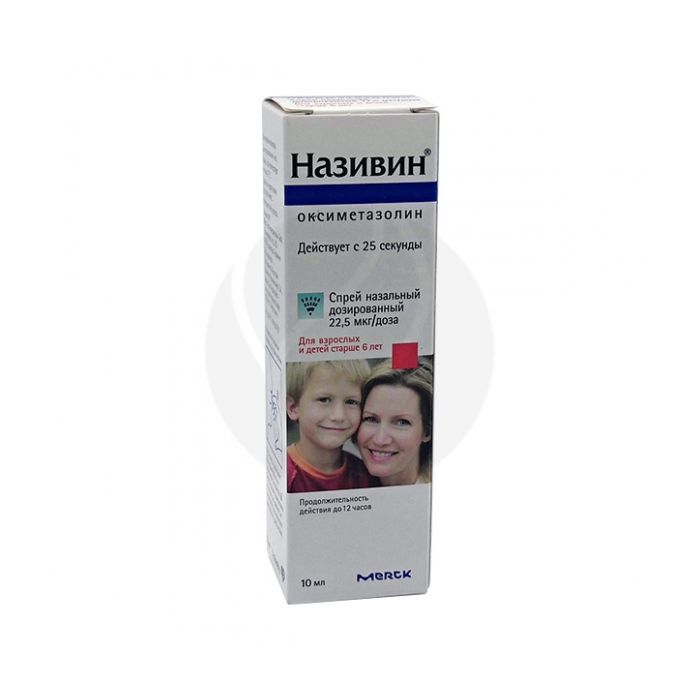Nazivin spray 22.5mkg / dose, 10ml
Expiration Date: 05/2027
Russian Pharmacy name:
Називин спрей 22,5мкг/доза, 10мл
Colds or viral infections of the upper respiratory tract, accompanied by a runny nose;
rhinitis of any etiology;
sinusitis;
eustachitis;
otitis media;
to eliminate edema before diagnostic manipulations in the nasal passages.
Adults and children over 6 years old: 1 injection into each nasal passage 2-3 times a day. If symptoms worsen or do not improve within 3 days, you should consult your doctor. In the recommended dose, without consulting a doctor, use for no more than 7 days.
Doses higher than recommended can only be used under medical supervision.
One 45 ?l spray contains 22.5 ?g oxymetazoline hydrochloride.
1 dose of the drug (45 ?l) contains:
Active substance:
Oxymetazoline hydrochloride 22.5 ?g.
Excipients: citric acid monohydrate 27.4 ?g, sodium citrate dihydrate 172.0 ?g, glycerol (85%) 1095.66 ?g, benzalkonium chloride (50% solution) 4.5 ?g, purified water 44037 ?g. Total: 45359.06 ?g, equivalent to 45 ?l.
atrophic rhinitis;
angle-closure glaucoma;
hypersensitivity to the components of the drug;
children under 6 years of age.
Carefully:
In patients taking monoamine oxidase inhibitors and other drugs that increase blood pressure up to 10 days after their use; with increased intraocular pressure, severe atherosclerosis, tachycardia, pheochromocytoma, during pregnancy and lactation, with severe forms of cardiovascular diseases (arterial hypertension, angina pectoris); with thyrotoxicosis and diabetes mellitus.
Pharmacodynamics
The drug NazivinЃ (oxymetazoline) has a vasoconstrictor effect. When applied topically to the inflamed nasal mucosa, it reduces swelling and nasal discharge. Restores nasal breathing. Elimination of edema of the nasal mucosa helps to restore aeration of the paranasal sinuses, middle ear cavity, which prevents the development of bacterial complications (sinusitis, sinusitis, otitis media). With local intranasal application in therapeutic concentrations, it does not irritate and does not cause hyperemia of the nasal mucosa.
The drug NazivinЃ nasal spray 0.05% acts from 25 seconds.
The duration of the drug is up to 12 hours. The results of a double-blind, placebo-controlled study in patients with acute viral rhinitis aged 12-70 years showed that the use of the drug NazivinЃ nasal spray 0.05% reduces the median runny nose duration from 6 to 4 days.
Pharmokinetics
With local intranasal administration, oxymetazoline does not have a systemic effect. The half-life of oxymetazoline with its intranasal administration is 35 hours. 2.1% of oxymetazoline is excreted in the urine and about 1.1% in the feces.
Overdose
After a significant overdose or accidental ingestion, the following symptoms may appear: constriction of the pupils, nausea, vomiting, cyanosis, fever, tachycardia, arrhythmia, collapse, cardiac depression, arterial hypertension, pulmonary edema, respiratory disorders. In addition, mental disorders may appear, as well as depression of the functions of the central nervous system, accompanied by drowsiness, a decrease in body temperature, bradycardia, arterial hypotension, respiratory arrest and the possible development of coma.
In case of an overdose associated with taking the drug inside, gastric lavage, activated carbon is prescribed.
Side effects
Sometimes: burning or dryness of the nasal membranes, sneezing.
In rare cases: after the effect of using NazivinЃ has passed, a strong feeling of 'stuffiness' in the nose (reactive hyperemia). Repeated overdose with local nasal use sometimes leads to such systemic sympathomimetic effects as increased heart rate (tachycardia) and increased blood pressure.
In very rare cases, anxiety, insomnia, fatigue, headaches, and nausea have been reported.
Long-term continuous use of vasoconstrictor drugs can lead to tachyphylaxis, atrophy of the nasal mucosa, and recurrent swelling of the nasal mucosa (rhinitis medicamentosa).
Special conditions
Long-term use and overdose of the drug should be avoided, especially in children.
Influence on the ability to drive vehicles and mechanisms:
After prolonged use or taking remedies for the common cold containing oxymetazoline, in dosages exceeding the recommended ones, a general effect on the cardiovascular system and the central nervous system cannot be ruled out. In these cases, the ability to drive a vehicle or equipment may be impaired.
Drug interactions
With the simultaneous appointment of MAO blockers and tricyclic antidepressants - an increase in blood pressure.
The co-administration of other vasoconstrictor drugs increases the risk of side effects.

